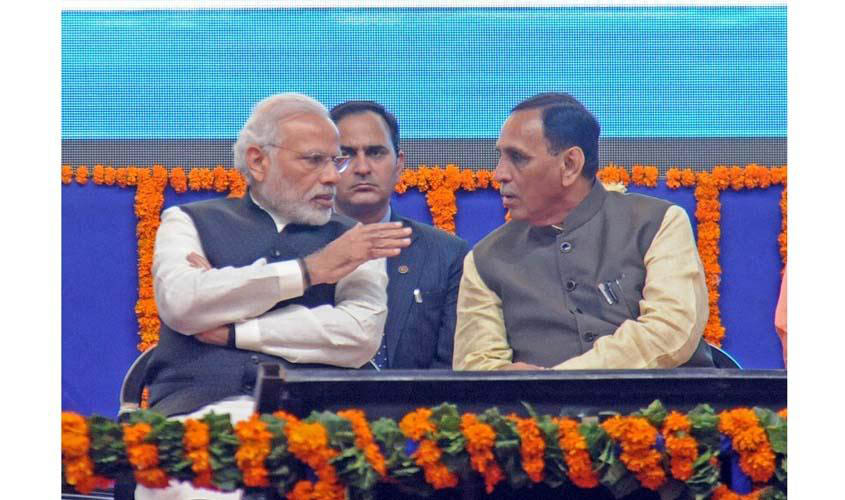 The Gujarat Assembly elections slated later this year perhaps would be more important than the 2019 Parliamentary polls. The state has been the bastion of the saffron brigade and over a span of time its critics have described it as the laboratory for the Hindutva brand of politics. Since 1995, the party has been a dominant force in this western state, known for its entrepreneurial prowess and understanding of economic issues pertaining to the running of businesses and industry. It is here that Prime Minister Narendra Modi acquired skills that made him the most successful politician in the country and thus helped him lead his party to an overwhelming
The Gujarat Assembly elections slated later this year perhaps would be more important than the 2019 Parliamentary polls. The state has been the bastion of the saffron brigade and over a span of time its critics have described it as the laboratory for the Hindutva brand of politics. Since 1995, the party has been a dominant force in this western state, known for its entrepreneurial prowess and understanding of economic issues pertaining to the running of businesses and industry. It is here that Prime Minister Narendra Modi acquired skills that made him the most successful politician in the country and thus helped him lead his party to an overwhelming
However, it will be after 15 years that the BJP is entering the electoral arena with Modi not as the Chief Minister. The Prime Minister had, through his persistent and aggressive campaign, clinched three victories for his party in 2002, 2007 and 2012 elections. Modi had become synonymous with Gujarat and even when he visited New York for the mega event at Madison Square Garden and later at Wembley in London, it was the Gujarati diaspora, which was at the forefront in welcoming him. He has never allowed the state to be out of his sight, though he obviously does not have the time to grant it his undivided attention, given that he is occupied with numerous other tasks as Prime Minister.
Therefore, the battle for Gandhinagar in November/December 2017 assumes profound political significance, since only an extraordinary victory would please Modi’s supporters, as they expect him to effortlessly romp home in the Assembly confrontation. The BJP’s rise in Gujarat was initially on account of the massive support it received from the dominant Patel community, which has usually stood behind parties opposed to the Congress, save the brief period when Chimanbhai Patel was the Chief Minister. Significantly, the Patels and other Patidars appear to be dissatisfied with the party and have provided ample indications that definitely must have set off alarm bells in the saffron camp.
Both Modi and BJP president Amit Shah realise the importance of the Patel support and therefore are making all possible attempts to pacify them. Recently, when former Chief Minister Keshubhai Patel’s son passed away, Modi made it a point to visit his house, despite a packed schedule with the visiting Japanese Prime Minister. Earlier Amit Shah and Finance Minister Arun Jaitley, who has once again been made in charge of the Gujarat elections, also met Keshubhai to offer their condolences. The Patels are miffed on account of being sidelined by the BJP. They are also disappointed that Vijay Rupani had replaced Anandiben Patel as the Chief Minister. There are other brewing issues as well, which the party is attempting to deal with. However, led by Hardik Patel, the younger generation of the community is exhibiting signs of palpable revolt.
Amit Shah has publicly been claiming that his party would win up to 150 seats in the Assembly elections, which even the party’s supporters find difficult to believe. As a part of strategy and with the aim of dividing the Kshatriya votes, which normally have gone to the Congress, the BJP apparently had nudged Shankarsinh Vaghela to move away on the eve of the crucial Rajya Sabha polls, where Sonia Gandhi’s political secretary Ahmed Patel managed to win despite the desperate effort to defeat him. The BJP’s position in the tribal belt, where it had scored convincing victories under Modi the last three times, is also not as comfortable as it once was. The party is banking on multi-cornered contests to ensure its win and if this does not happen, it could be in serious trouble.
The reason for Gujarat having become more important than ever before is due to the fact that it is the first full-fledged large state administered by the BJP, which is going to the polls since the 2014 grand victory. In every other state where the BJP triumphed, there existed a government of a different party. In Goa, the party did not receive a clear mandate on its own steam, forming the government via manipulation. In Punjab, where it was in power in alliance with the Akalis, it virtually was wiped out. Earlier in Delhi, where the BJP secured 32 seats in 2013, it was merely able to win three in the 2015 Assembly elections. The Madhya Pradesh, Chattisgarh and Rajasthan polls are slotted for next year and therefore it is Gujarat which would define the course of political events. Thus, the party has to defend its supremacy in this state.
Unfortunately, for the BJP the elections are timed when the economy is in the doldrums. For the business savvy Gujaratis, the basic aspects of economy are pivotal to the state of affairs. Political pundits had linked the unprecedented BJP win in Uttar Pradesh to “the success of demonetisation”. However, the real test lies in Gujarat, where the ramifications of the steps taken by the Central government to strengthen the economy would be examined through microscopic lens. Therefore the outcome in this state would have an impact on the elections that are to follow later.
If the BJP emerges victorious in Gujarat, its rivals will be left gasping for breath prior to final showdown in 2019. It is solely the Modi Magic that could sway the show. Between us.

